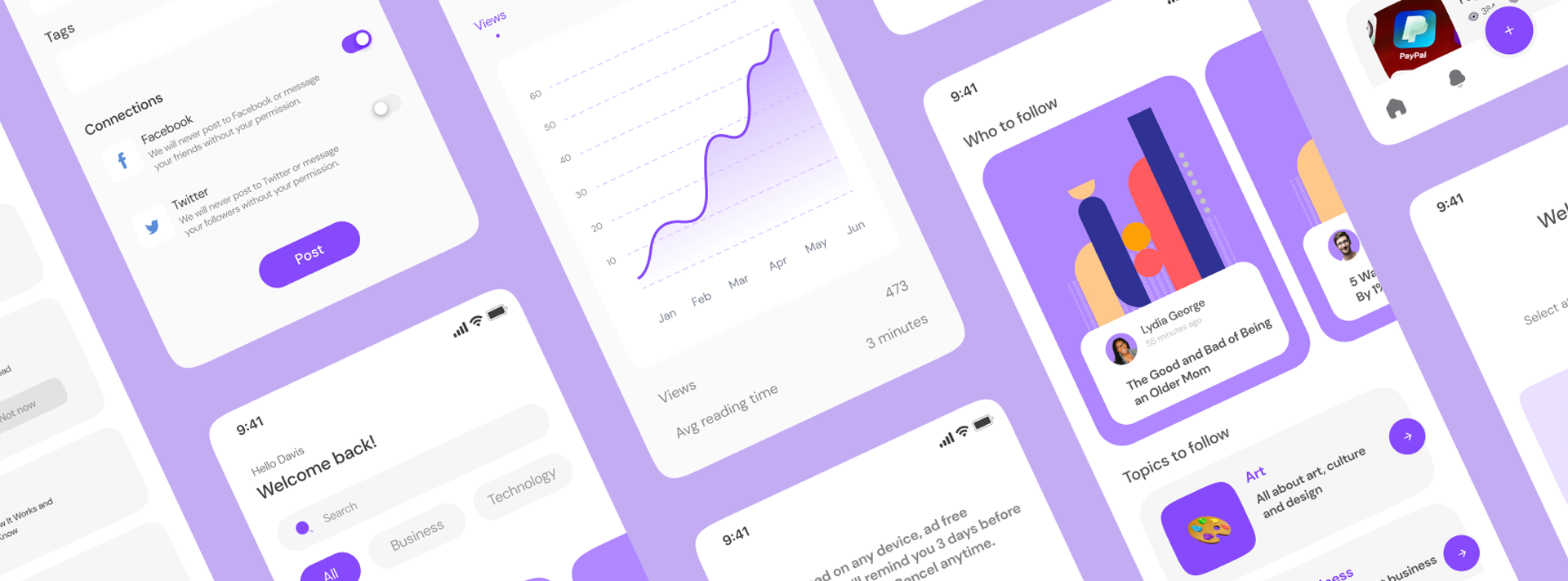
Your One-Stop Shop For Hybrid Application Development
Hybrid App is a great software application combining the best web and native apps. The primary reason for hybrid being a developer’s number one choice is the convenience of not writing code again and again. Once the code is written, it can be applied to several different platforms. With Hybrid apps, you get the best of both worlds - less development cost and easily accessible data. What's more, you can operate offline with Hybrid app development. The latest frameworks for Hybrid app development are Sencha, PhoneGap, and others, which help mobile applications function smoothly and deliver optimal performance.
Fictive Studios is a top-notch company that specializes in developing hybrid apps. We offer mobile applications that are scalable and unmatched in quality. Our team of professionals can assist you in determining an ideal cross-platform framework that aligns with your business objectives. With our dedicated development team, you can effectively reach out to your target audience in a short period of time. Fictive Studios employs different cross-platform tools and technologies like Flutter, Ionic, React Native, Phone Gap, and Xamarin. We make sure to provide an enriched that all our apps provide an enhanced user experience and seamless functionality across all platforms, including Android, iOS, and Windows. We understand the issues businesses face in developing mobile apps. We have a proven track record of resolving those issues effectively and living up to our title as a leading mobile application development company. We have worked with startups and enterprise-level businesses worldwide and continue to create robust hybrid app development solutions that help companies to grow without settling for less.
Industries We Have Assisted With Hybrid App Development
- E-commerce and retail
- Healthcare and wellness
- Travel and tourism
- Banking and Finance
- Education and e-learning
- Entertainment and media
- Food and beverage
- Transportation and logistics
1) Cross-Platform App Development
Our team of expert developers be create apps that can be supported on all devices, including iOS, Android, and Windows. With our cutting-edge technology and years of experience in the industry, we'll make sure that your app is fully functional and visually appealing so that your users can enjoy a seamless experience.
2) App Testing & Quality Assurance
Our App Testing and QA Service is an exhaustive solution that ensures your mobile or web app is operating seamlessly and tickles the fancy of your users. Similarly, our experienced app testing team utilizes industry-standard tools and techniques to determine and fix bugs or errors.
3) Custom App Development
Our custom app development service is conceived to assist businesses in creating unique and ingenious mobile applications that tend to their specific needs. Our proficient developers build tailored and user-friendly custom apps for clients.
4) UI/UX Design
The UI/UX design services we offer for mobile app development are unbeatable in their excellence. We are committed to delivering a seamless and user-friendly experience for all users, concentrating on aligning the design with the brand and app's vision.
5) App Maintenance & Support
We offer ongoing support to make sure your app consistently performs to its best potential and efficiency. From minor bug fixes to rigorous performance enhancements, our team of experts will keep your app up-to-date and ensure that it is running smoothly. With periodic updates and maintenance, you can rest assured that your app’s performance will never dip.
6) Hybrid App Development
Our team excels in crafting tailor-made hybrid mobile applications that perfectly sync with your business objectives. Our expertise in employing cutting-edge cross-platform frameworks and development tools has enabled us to deliver innovative solutions to numerous startups and enterprises, helping them achieve unprecedented success.
1) Expert Developers
Our team comprises highly skilled professionals specializing in Hybrid app development. We are committed to providing top-notch solutions that are not only scalable but also genuine. Our goal is to all your requirement and help you reach new heights in your business through our exceptional application.
2) Highly Secured Technology
Our organization prides itself on utilizing safe and reliable technology for all hybrid app development. We have worked diligently to establish ourselves as a trustworthy company and consistently maintain that reputation.
3) Agile Methodologies
With our expertise in agile Hybrid app development, we strive for nothing less than exceptional performance. Our unparalleled approach sets us apart as the leading mobile app development company. You can trust us to deliver outstanding results for your project.
4) Cost-Effective Solutions
At Fictive Studios, we guarantee cost-effective services always delivered on time. We maintain an unwavering level of professionalism and relentlessly strive for the most advantageous outcome for our clients.
What is hybrid app development?
What are the advantages of hybrid app development?
What are the limitations of hybrid app development?
How long does it take to develop a hybrid application?
Is Hybrid app development expensive?
My question is not listed here. What do I do?

Building The Future One Line Of Code At A Time

Mobile App Solutions For Everyone, Everywhere
We pride ourselves on our ability to bring your unique vision to life through our cutting-edge technology and innovative solutions.
Retail, Ecommerce
Education & e-learning
Healthcare & Fitness
Logistics & Distribution
Social Networking
Real Estate
Travel & Hospitality
Food & Restaurant
On-Demand Solutions
Gaming
Partnerships We Have Built Through Our Digital Solutions
At Fictive Studios, we are proud to have partnered with over 2000 businesses, ranging from startups to enterprises, to provide industry-leading mobile app development solutions tailored to their unique business needs. Every business is different, and we are passionate about helping our clients achieve their goals through our extensive range of app development services.
Start Up Business

Small & Med Business

Enterprise

Agencies

What Our Clients Say
We possess the capability to create applications across a diverse range of genres - simply specify your requirements and we'll bring your vision to life.

Let's Build Something App-tacular Together
Join forces with Fictive Studios, the premier Mobile App Development Company in the US. With our bespoke app development solutions, watch your business soar to new heights.
GET A QUOTE
















